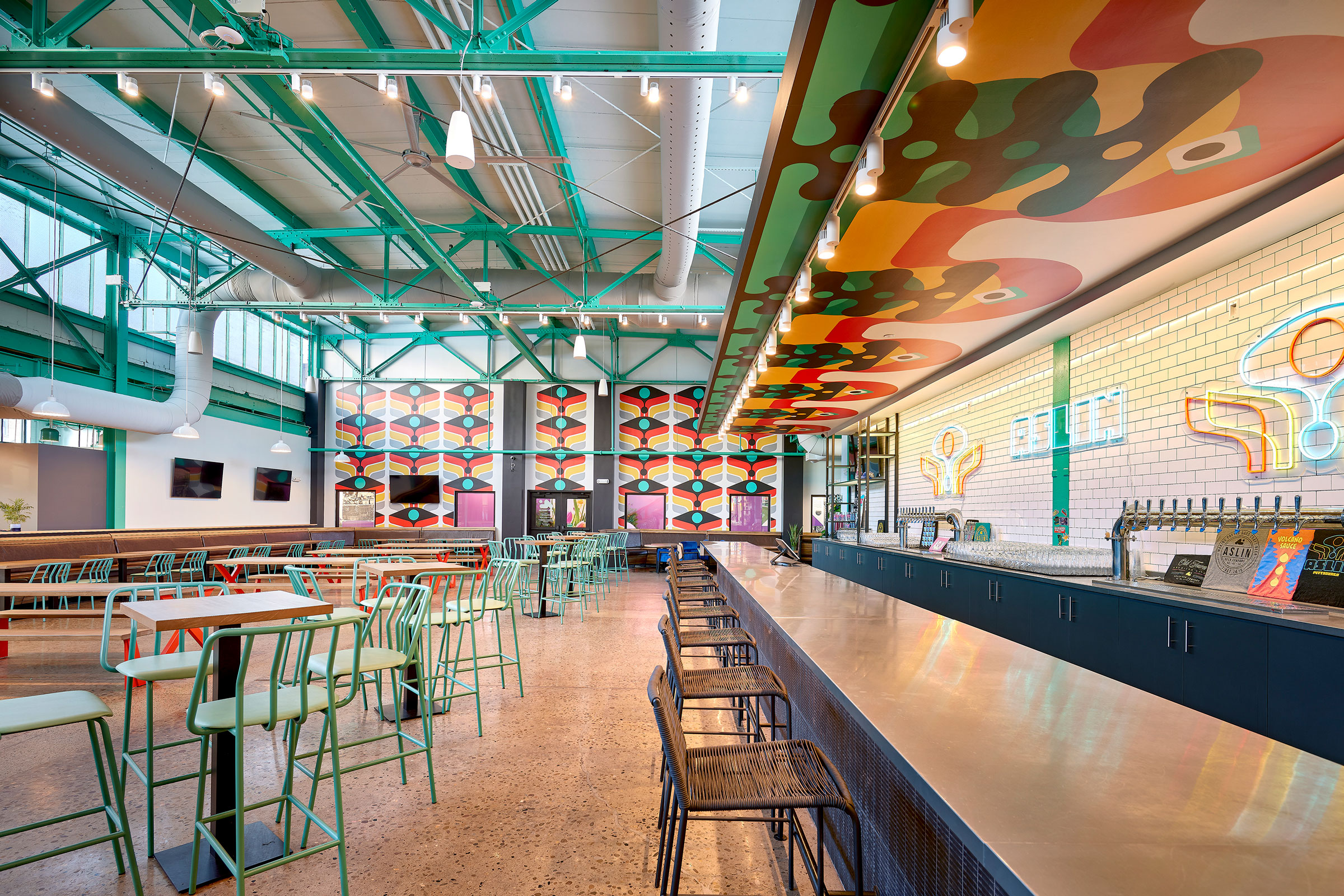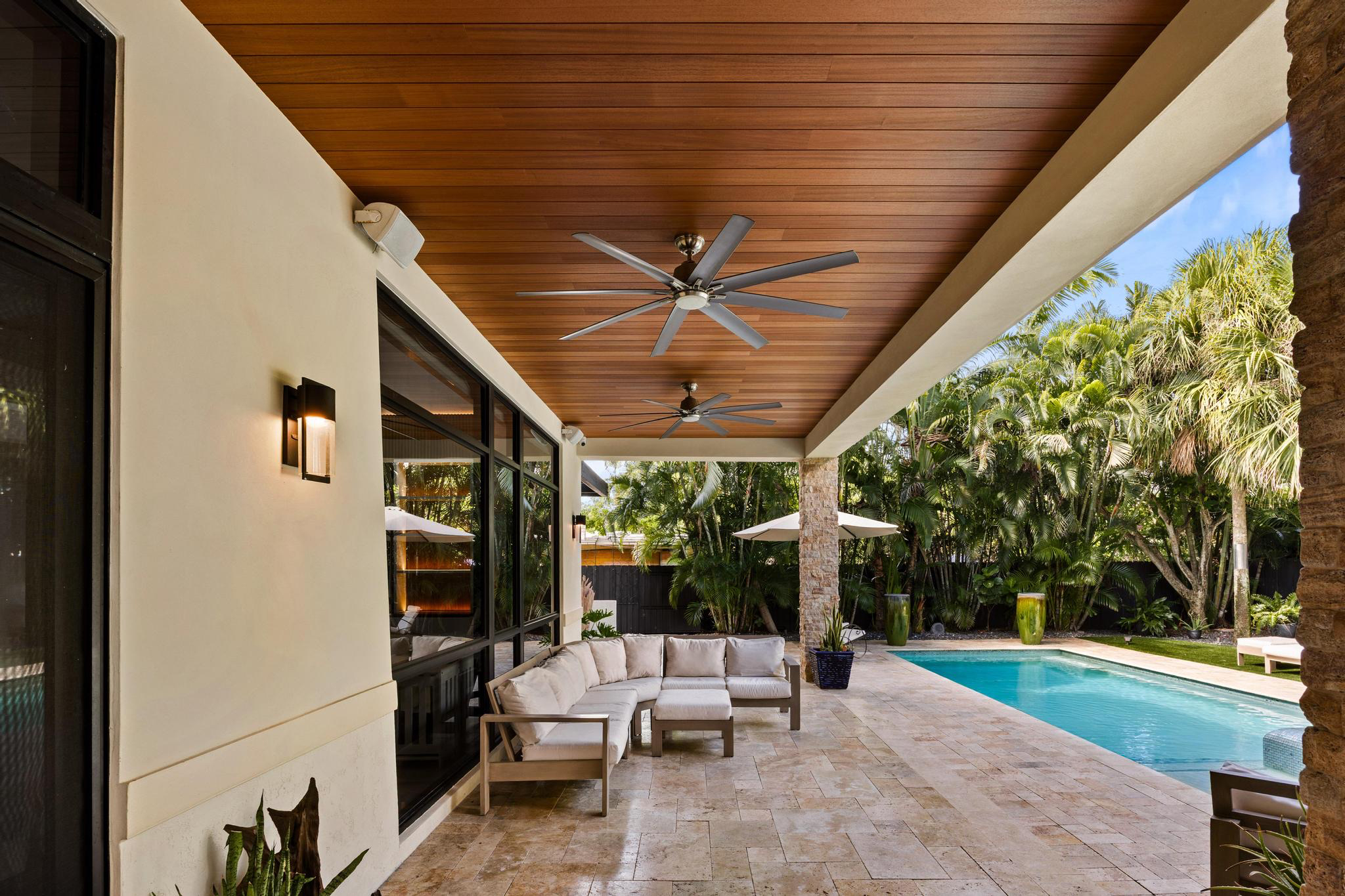Story at a glance:
- Aslin’s bold new tap room and brewhouse recently opened inside Pittsburgh’s Historical Terminal Building.
- Architecture and design firm //3877 worked with Aslin Beer Company on the exciting redevelopment.
From 1850 to 1964 the 13-block parcel of the Strip District Terminal made significant contributions to Pittsburgh’s commercial history, labeled as a historic site by the National Park Service in 2014. Once a hub for the regional wholesale produce industry, the iconic Terminal Building has been revitalized, bringing a lively shopping and dining spot to the bustling district. Today the architecture continues to define the iconic neighborhood, establishing a place to gather, eat, and socialize alongside the rest of the community.
The Mission
As an architecture and design firm deeply rooted in innovation and creativity, //3877 was thrilled to collaborate with longtime project partner Aslin Beer Company on their new endeavor within the redevelopment of the historic Strip District Terminal building.
In approaching the project, it was critical to balance bringing a new and refreshing space to life while embracing and honoring the existing structure and its significance to the community. The Aslin Beer Company Pittsburgh Taproom & Brewhouse brings a revitalized energy and the quintessential Aslin experience to the building––inviting beer enthusiasts, foodies, coffee aficionados, neighbors, and tourists alike to join together over tasteful bites, craft beers, and good times.
How We Did It
This project presented a unique opportunity to ignite new energy in a cherished landmark while paying homage to the rich heritage of the surrounding neighborhood. From the outset the goal was to create a space that not only reflected the essence of Aslin’s brand but also seamlessly integrated with the architectural fabric of the terminal building––utilizing existing structural and aesthetic components where possible to maximize the adaptive reuse of the space. Drawing inspiration from the commercial prowess of the Strip District, the team set out to design an environment that would serve as a dynamic food and beverage destination for locals and visitors alike.
At the heart of the design concept is the idea of marrying industrial aesthetics with contemporary flair. From the moment guests approach the building they are greeted by a facade that pays homage to the area’s industrial past while infusing the space with a vibrant, modern sensibility. The simple and colorful design provides a complementary backdrop to the stark yet stunning original industrial building.
Adaptive Reuse
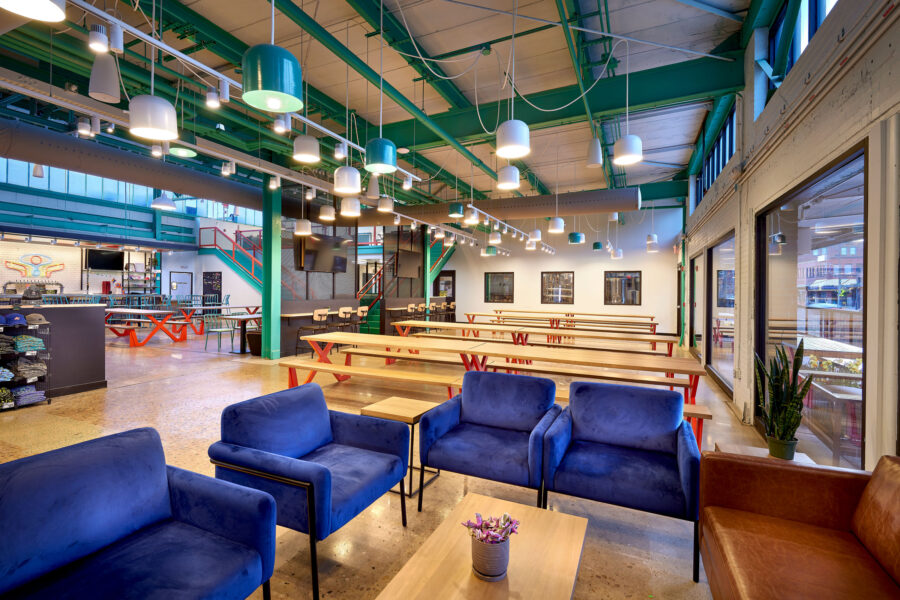
Photo by Ed Massery
The adaptive reuse of the terminal, as demonstrated in Aslin Beer Company’s new location, creates a focal point for community engagement and revitalization while maintaining a sustainable approach to design.
The building’s facade and interior steel beams remained paramount to the renovation––serving as a point of inspiration for the design itself. //3877, enamored by the natural beauty of the stripped-down structure, preserved many of the interior elements that serve as a stand-out visual feature. The rich history of the building evokes a strong sense of place for guests through the juxtaposition of old and new. Partnered with its sustainability impacts, adaptive reuse projects pave a way forward for development, creating refreshed spaces that meet modern wants and needs without creating unnecessary work or waste.
This project represents the latest adaptive reuse initiative for both //3877 and Aslin; the team previously collaborated on Aslin Beer Company’s Brewery, Coffee Shop & Beer Garden in Washington, D.C. The design team transformed a vintage gas station into a lively beer garden and cafe, featuring an indoor/outdoor space with an overhead canopy. The space is reminiscent of the 1950s-era filling station, transporting guests back in time as they enjoy Aslin brews in the sun or the shade. Each location demonstrates Aslin’s affinity toward reusing existing buildings and integrating clever design to create a community gathering space rooted in local history.
Industrial Inspiration
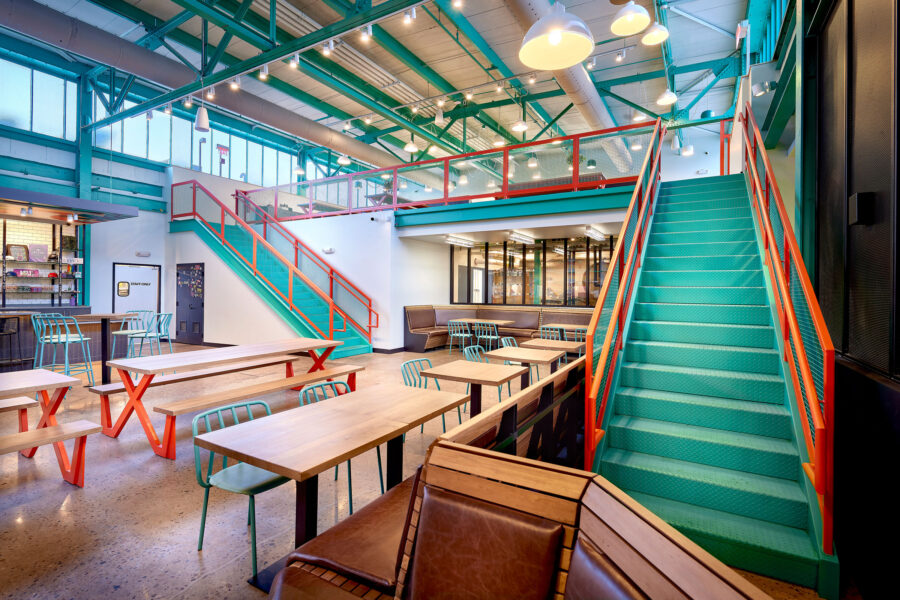
//3877 designed the new Aslin taproom and brewhouse to be both vibrant and in keeping with Pittsburgh’s Industial past. Photo by Ed Massery
Upon entering patrons are welcomed into a multi-functional space that caters to a diverse range of needs and preferences. The café area, strategically positioned near the main entrance, offers a convenient spot for guests to grab a quick coffee or bite to eat before heading off to explore the rest of the taproom. Meanwhile, the central bar serves as the focal point of the space, anchoring the design and inviting patrons to linger and socialize over craft beers and artisanal cocktails.
The space isn’t like a typical bar––the design completely immerses guests in their environment by highlighting Aslin’s 10-barrel brewhouse. Adjacent to the bar top, the brewery takes center stage, providing guests with a behind-the-scenes glimpse into the process of crafting the very beverages on the menu. By strategically positioning the brewery beneath a mezzanine, the design creates sightlines that offer tantalizing glimpses of the brewing equipment, further enhancing the overall ambience of the space.
Throughout the interior, playful colors and eclectic lighting fixtures add a touch of whimsy, creating an atmosphere that is both inviting and unique. Drawing inspiration from Pittsburgh’s rich commercial history in the steel industry, the design incorporates steel elements through metal screens, counters, bathrooms, and the outward portion of the mezzanine. The exposed steel structure, painted with an eye-catching green, serves as a distinctive statement piece that captures the attention of passersby and sets the tone for the Aslin experience within.
As patrons explore the space they are invited to journey through layers of history and culture, each corner offering a new discovery and touchpoints of connectivity. The design is rooted in place with subtle nods to Pittsburgh’s renowned history in the steel industry, further signifying the building’s presence in the community. From the outdoor patio equipped with comfortable seating and modern amenities to the cozy interior spaces filled with colorful and comfortable furniture and bright accents, every detail has been thoughtfully curated to create a memorable and immersive experience for guests. The vibrant design helps facilitate the lively community atmosphere Aslin Beer Company is known for.
Design Challenges
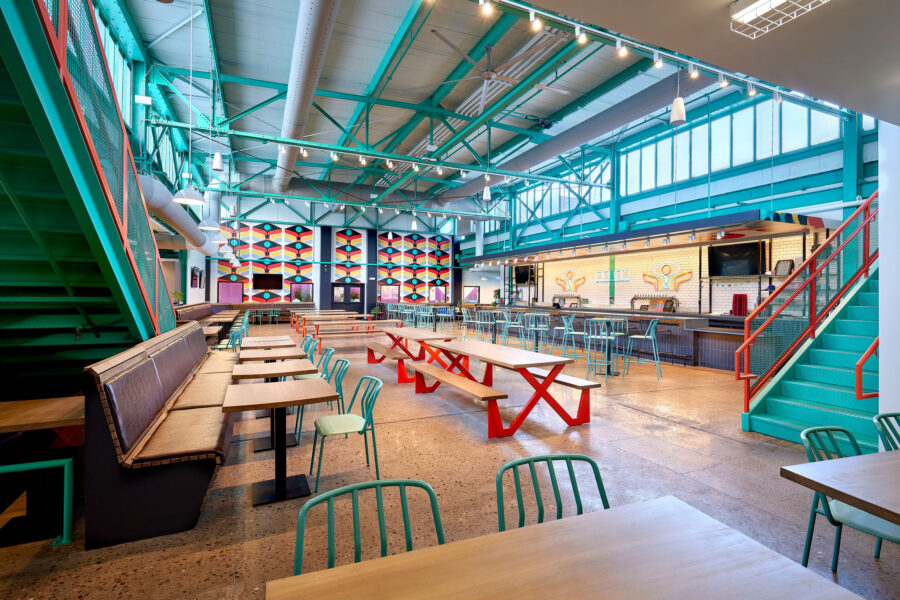
Aslin Brewery. Photo by Ed Massery
One of the key challenges of the project was providing a sense of scale to such a tall and bright space. With an incredibly high ceiling, the original space felt too expansive and empty. The design team combatted this by painting the steel beams and exposed structure a bold green. The use of color helped accentuate the trusses and the mezzanine, which shortened the visual verticality without restricting the experience.
The design also creates zones with different seating and social opportunities that help to break up the large floorplan into more digestible, approachable pieces. When utilizing large spaces for hospitality, it’s important to evoke a sense of intimacy through the design.
The existing building’s sloped concrete flooring also posed a unique challenge for the design team. Specifically tailored to the terminal’s original use as a produce hub, the floor was slanted for draining purposes. To solve this issue each area of the new space, including the millwork, stairs, and furniture, is meticulously planned to work in conjunction with the slope to conceal the unlevel floor beneath.
Historic Transformation
Aslin Beer Company Pittsburgh is a testament to the power of collaboration and creativity in shaping the built environment. Working closely with Aslin, the //3877 team transformed a historic landmark into a vibrant hub that celebrates the spirit of community, inviting patrons to gather and connect in the heart of Pittsburgh’s Strip District. Through the adaptive reuse of the terminal building, the project highlights the importance of embracing existing structures while repurposing them into spaces that will unite the community for years to come.
David Shove-Brown contributed to this article.

